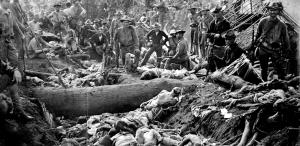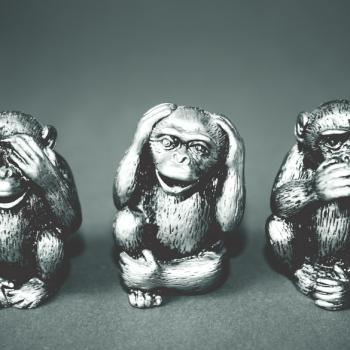~ What healing might occur if we stopped ignoring our genocidal past? ~

(Part 2 of a 3 part article.)
You’re having lunch at a New Jersey diner with your friend Marty McFry, who as explained earlier, is a time traveler.
“Tell me about the first time America was great,” says McFry, pushing his strawberry shake aside. “Because you can’t make America great again if your idea of greatest is wrong.”
“Everybody knows that Manifest Destiny was a disaster,” you say. “All that westward expansion hurt the American Indians. But things got better in the 20th century.”
“When the Manifest Destiny enthusiasts couldn’t find any more land to steal at the end of the 19th century, they went global,” McFly says. “In 1894, Senator Orville Platt of Connecticut said, ‘I firmly believe that when any territory outside the present territorial limits of the United States becomes necessary for our defense or essential for our commercial development, we ought to lose no time in acquiring it.’[1] President Theodore Roosevelt added, ‘I should welcome almost any war, for I think this country needs one.’[2] So when Cuba and the Philippines were rising up from Spanish oppression in 1898, we came not to help but destroy. We took that golden economic opportunity and decimated them because their army was no match for ours. I have no words to describe the carnage wrought on these beautiful people who had nearly gained independence. Our ‘great nation’ brought genocide to as many as 600,000 Filipinos.[3] In the old photos, U.S. soldiers gloat over mounds of dead bodies, and yet this atrocity receives not one sentence in most high school text books. We slaughtered thousands more in Cuba. Meanwhile, we squashed Central America in the Banana Wars, so the United Fruit Company could place a commercial stranglehold on Latin American that still remains there today.”[4]
“Did these things really happen?” you say with a taunting glare in your eyes.
“That and more besides. In 1900, Senator Albert Beveridge of Indiana summed it up by saying, ‘We are the ruling race of the world … We will not renounce our part in the mission of our race, trustee, under God of the civilization of the world … He has marked us as his chosen people… He has made us as his chosen people… He has made us adept in government that we may administer government among savage and senile peoples.’”[5]
“There’s always a racist in the bunch,” you say. “That doesn’t mean everybody thought like he did.”
“All of the influential ones did,” McFry says. “Congress rejected resolutions calling for the liberation of smaller nations, preferring to subjugate them.[6] The State Department and the Armed Forces agreed. America’s policy-makers have been consistent from the beginning, taking land that isn’t theirs and believing themselves to be superior to the ‘savage and senile people.’ America has been so unwavering at global domination that there have only been 19 years in all of America’s history when we were not at war!”
“America has a reputation for defending the little guy,” you insist, “and making the world safe for democracy.”
“So we’re the good guys in white,” says McFry with a chuckle. “We’re more like the fox who’s in charge of the henhouse. Sure, the propagandists say we’re defending helpless nations, when in fact we’re defending U.S. military bases and international business. An honest look at history shows a seamless continuum of American oppression. In 1903, we covertly created a fake revolt in Panama so we could take over and build the canal. Soon after, Roosevelt declared the U.S. right and responsibility to take control of the Dominican Republic, Honduras, Haiti, Panama and Cuba, at the cost of many thousands of lives. We caused a revolution in Nicaragua in 1909 so we could turn around and suppress it in 1912. Western powers carved up the Middle Eastern nations after World War I, with greedy eyes on oil and natural resources. The CIA gunned down freedom fighters all over the world simply because they threatened our business interests. We helped put tyrants like Noriega and Saddam Hussein in power. No, we were not making the world safe for democracy. We were making it safe for rich white businessmen, in the name of petroleum, minerals, banking, military bases, and cheap goods and labor.”[7]
“All that was orchestrated by rogues who were out of synch with the heart of America,” you insist.
“Meanwhile, back in the heart of America,” McFry says, “good white Christians were demanding cheap oil and cheap food and cheap clothes from oppressed nations, while turning blind eyes to segregation, lynchings, police brutality, bombings and racially-motivated capital punishment at home. They were accepting racial inequities of jobs, educational opportunities, voting rights and health services.”
“You sound like a lunatic on the fringes,” you say, trying to stay calm. “From what I hear in the media, it’s not a big deal.”
“Do you honestly think our government is so squeaky clean they don’t use propaganda and cover-ups?” McFry asks. “Where do you think all that greatest-nation-in-the-world crap comes from? Or that cheesy making-the-world-safe-for-democracy? My gosh, the pentagon makes it no secret that they’re behind huge ad campaigns to make the largest army in history look like the sweetest papa you’ll ever meet. Who do you think pays for all those discounts for military personnel down at the box stores? It’s the war department! You know it’s propaganda when you can’t say anything against guns, God and the military without folk seeing it as blaspheme. So the myth of America’s great virtue continues to mask systemic oppression, while the poor keep getting poorer and the rich richer. Worst of all, people of faith say that God supports all this shit.”
McFry takes a deep breath and lets it out slowly, a look of despair etched in his dark eyes.
“The next time you pick up a two-bit banana at the supermarket,” he says, “ask yourself how many people were killed and raped and enslaved to bring it to you that cheap.”
With a sharp intake of breath, you swallow your words. You can hardly argue with someone who travels in time, who was there to watch history happen in real time.
“Separate checks?” the server asks.
“I got it,” says McFry, pulling out his wallet.
To be continued …
~~~~~~
“We have pacified some thousands of the islanders and buried them; destroyed their fields; burned their villages, and turned their widows and orphans out-of-doors; furnished heartbreak by exile to some dozens of disagreeable patriots; subjugated the remaining ten millions by Benevolent Assimilation, which is the pious new name of the musket; we have acquired property in the three hundred concubines and other slaves of our business partner, the Sultan of Sulu, and hoisted our protecting flag over that swag. And so, by these providences of god — and the phrase is the government’s, not mine — we are a World Power.” — Mark Twain, The New York Herald, 15 October 1900.[8]
Image by John J. Pershing, U.S. Army, Bud Dajo Massacre Trench 1906, Wikimedia Commons:, Public Domain.
[1] Don Lehman Jr., Colonialism to Independence: Southeast Asia (1511-2014) (North Carolina: Lulu, 2015), 115.
[2] “April 16, 1897: T. Roosevelt Appointed Assistant Secretary of the Navy,” PBS, https://www.pbs.org/crucible/tl7.html.
[3] “Statistics of Democide; Chapter 13; Death by American Bombing and other Democide,”
by R.J. Rummel, Hawaii.edu, www.hawaii.edu/powerkills/SOD.CHAP13.HTM.
Senator Albert Beveridge of Indiana said, “The Philippines are ours forever … and just beyond the Philippines are China’s illimitable markets … the Pacific is our ocean … The power that rules the Pacific is the power that rules the world … That power is and will forever be the American Republic.” Source: “U.S. Senator Albert J. Beveridge speaks on the Philippine Question, U.S. Senate, Washington, D.C., January 9, 1900,” USC US-China Institute, https://china.usc.edu/us-senator-albert-j-beveridge-speaks-philippine-question-us-senate-washington-dc-january-9-1900.
[4] “The Banana Wars: How the U.S. Plundered Central America on Behalf of Corporations,” by Mark Oliver, All That’s Interesting, 14 September 2017, https://allthatsinteresting.com/banana-wars.
[5] Albert J. Beveridge, “The March of the Flag Campaign Speech,” 16 September 1898, as reprinted at “Teaching American History,” https://teachingamericanhistory.org/document/the-march-of-the-flag-campaign-speech.
[6] “The Philippines,” Digital History, www.digitalhistory.uh.edu/disp_textbook.cfm?smtid=2&psid=3161.
[7] Roger Pearce, “Yankee Imperialism, 1901-1934,” United States Foreign Policy, http://peacehistory-usfp.org/yankee-imperialism.
[8] Yves Boquet, The Philippine Archipelago (New York: Springer Publishing, 2017), 22.












